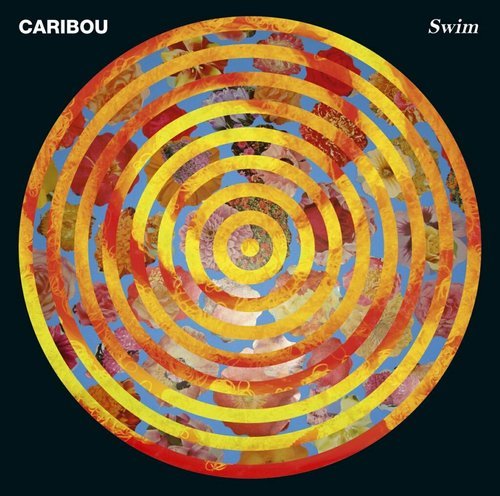In 2005, when touring for the album The Milk of Human Kindness and having just changed his nom de plume from “Mantioba” to “Caribou,” Dan Snaith had chosen a curious opening band called Junior Boys. What made having the Junior Boys an interesting choice was that they were a group defined by club sounds, with each track having solid 4/4 kicks, wobbly basslines, and ghostly vocals. How did this fit with Dan Snaith’s Caribou, if at all? As it turns out, it was the beginning of an obsession with Snaith and the sounds of dance music, one that blossoms in full on his latest album Swim.
The first sound of Swim sounds incredibly similar to someone diving into the deep end of a pool, with the giant reverberations of a pool hall transforming the splash into an explosion. This is apt as right after that sound begins to decay, the single “Odessa” kicks into full throttle. This is outright funky techno, bursting at the seams with those rich, organic sounds that many a Caribou fan have loved on previous albums. The further use of disco-style vocal hooks and that impossibly thick yet loose bassline make it a super-catchy anthem of summery nights out. And yet despite the genre change, this still carries the vulnerability of previous songs such as “Irene” (from 2007’s Andorra) and “Hello Hammerheads” (from The Milk of Human Kindness). Indeed, Snaith’s unique ability to change forms and yet still have the songs to have that beloved Caribou sound and feel, remains strong as ever. This is also incredibly true on “Found Out,” where Snaith’s lyrics chime in “While she waits/she holds her breath/and thinks about the things he said” upfront in the mix and carrying throughout the song, with the distorted fills reflecting the upheveal in the words. And then there’s also “Kaili,” which sounds almost like a remix of an Andorra tune, especially with its flutes and horns.
The strongest tracks though are where Snaith fully embraces his love of club sounds. “Leave House” has the irresistible draw of Downtown NYC disco (think Arthur Russell) with its flute riff and cowbell. And then there’s the throbbing “Bowls,” so named for its sampled chiming bowl sounds that ring cross-panned and delayed, shifting in and out of the mix, along with the wonderful swells of harp, which could easily be a release by the Cologne-based techno label Kompakt. Last on the album is the awesome “Jamelia” with the soaring vocals of Luke Lalonde of Born Ruffians (another band who has previously toured with Snaith), crescendoing into a beautiful breakdown to close it out fantastically.
If there is one thing to complain about, it is that this album is meant to be the soundtrack to something, either being playing over club monitors, the soundtrack to a party, or to jam in the car. However, this is what Snaith was after, to “figure out” how an artistically-inclined techno artist like James Holden or Nathan Fake can convey an excellent dance track with the feelings of pop, and to this end, he was successful.

